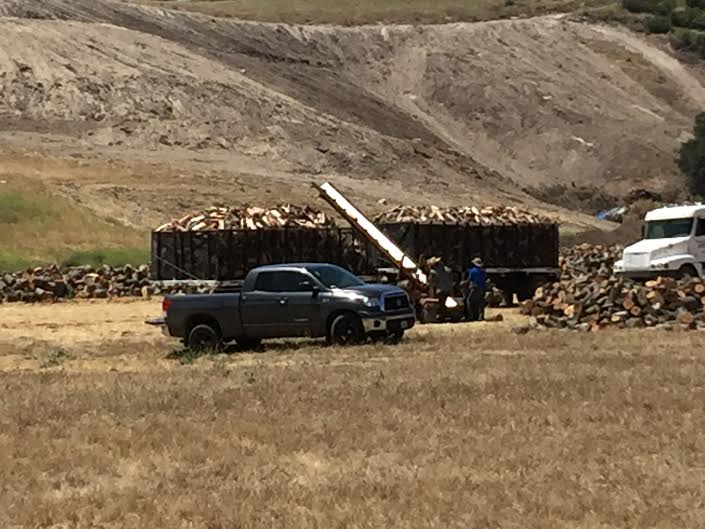SLO County supervisors extend oak tree, reservoir ordinances
August 17, 2016

Truckloads of lumber being removed
The San Luis Obispo County Board of Supervisors voted unanimously Tuesday to extend a temporary regulation that prohibits the removal of oak trees without a permit. In a separate unanimous vote, the supervisors extended an ordinance that aims to protect the county’s underground water resources.
In July, the board of supervisors adopted the urgency ordinances in response to public outrage over the actions of billionaires Stewart and Lynda Resnick. Since the Resnicks bought Justin Vineyards in 2010, they have cut down thousands of oak trees from properties they purchased in North County.
During the July meeting, Supervisor Bruce Gibson rejected recommendations by Supervisor Debbie Arnold to have a more comprehensive urgency ordinance that considered zoning. Supervisor Debbie Arnold then voted against the urgency ordinance, saying the regulation was too far-reaching in that it did not differentiate rangeland from agricultural land and placed burdensome requirements on ranchers.
“It is to restrictive and it goes far beyond the problems that we are having,” Arnold said. “It was adopted so quickly it did not take into account the number of dying trees because of the drought or provide exemptions to people building single family homes. It is onerous and expensive.”
Though Arnold voted Tuesday to extend the ordinance, she, along with Supervisor Lynn Compton, argued against a long-term extension of the regulation.
Arnold and Compton said the tree removal should be a temporary measure that should only be extended for up to six months.
Supervisors Bruce Gibson and Adam Hill called for extending the ordinance for a full year. Hill argued oak trees are commons, like water and fisheries, that everyone draws from and uses to sustain themselves.
As a compromise, Gibson proposed a nine-month extension, which the supervisors unanimously approved. The ordinance prohibits property owners from removing oak trees without first obtaining a permit. The urgency ordinance requires land owners who want to remove 10 percent of a tree canopy to get a conditional use permit. Those who wish to remove less than 10 percent must obtain a minor use permit.
Arnold said she is now focused on addressing issues with the urgency ordinance in a permanent ordinance.
“We were not permitted to change the urgency ordinance, we either had to keep it or throw it away,” Arnold said. “I want to focus on a well-thought out permanent ordinance. It should address where we are having problems; converting rangeland to development and farming.”
Criticism of the Resnicks and Justin Vineyards peaked after aerial photos showing the clear-cutting of oak trees on Justin Vineyards-managed property emerged in June. At the same time, property owners also voiced concerns with Justin Vineyards using underground water sources to fill large reservoirs during a drought.
Following much less debate, the board approved the extension of the reservoir ordinance. The supervisors also directed county staff to consider drafting permanent regulations for reservoirs and agricultural ponds.
As a measure to protect water resources, the board adopted an ordinance that requires reservoir approvals to likewise go through a county permit process.
On Tuesday, the board voted to extend the tree removal ordinance until April 2017 and to extend the reservoir ordinance until May 2017.






The comments below represent the opinion of the writer and do not represent the views or policies of CalCoastNews.com. Please address the Policies, events and arguments, not the person. Constructive debate is good; mockery, taunting, and name calling is not. Comment Guidelines